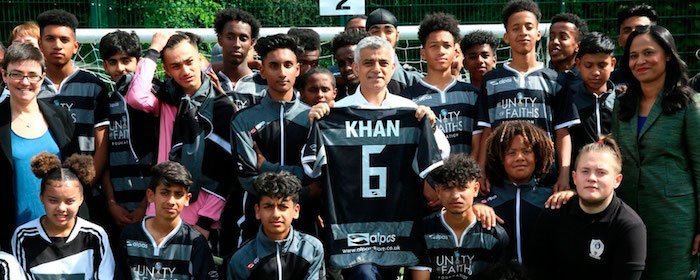It’s long been known that sport can have a positive impact beyond immediate concerns of winning or losing. Football, with its wide universal appeal regardless of age, race or gender, is particularly well suited for this purpose.
In the last few months, for instance, we’ve seen a handful of footballers commit 1% of their salaries to Juan Mata’s ‘Common Goal Initiative’. Such a belief in the power of football is at the core of The Unity of Faiths Foundation, a youth football club started three years ago in Southall, West London.
TUFF FC, whose name derives from an accidental misspelling of ‘tough’ by some of the first children involved in the project, has grown from an initial 15 young participants to 33 directly involved and thousands estimated to have been inspired across the capital and the world.
The aim of the club is to encourage integration among young people from different backgrounds, as well as to promote a sense of belonging and connection to the local area.
This has become especially important for those from minority backgrounds at risk of alienation. Such alienation can result in impressionable or vulnerable youngsters becoming prime candidates to be targeted by radicalised organisations.
As well as playing exhibition matches and entering tournaments across London, coaching isn’t limited to the pitch. The project is underpinned by rigorous and robust planning, with the TUFF FC project comprising of four stages.
Firstly, the aim is to simply get children playing the game and promoting ‘British values’. These values are really ‘global values’ as Dr. Shamender Talwar, one of the co-founders of the club, tells The Set Pieces.
Volunteering in the local community, playing for the club, and receiving valuable life lessons, fosters the hope that graduates will move on to further education or employment “with a firm British identity”.
Each stage of the project helps to promote a sense of belonging, with former TUFF FC players also encouraged to return and mentor the next generation at earlier stages of the process.
The process is key to engaging young people who might be targeted by extremists with the intent of stirring up community tensions and radicalisation.
For some youngsters in areas like Southall, the delicate balance between devotion to faith and British life can be pounced upon. TUFF FC still want players to celebrate their heritage, as Dr. Talwar explains, but also feel part of British society: “While your religion may be Muslim, or your origins are in a particular different country, you can still have an identity that is British.”

The vital work of TUFF FC is gradually being recognised further afield. The club was contacted by Somerset Council to help with their integration campaign for young people across the county.
According to Dr. Talwar, “white working and middle class kids in some areas might not meet anyone called Mohammed now (at this stage of life), but eventually they are going to in employment or at university. It’s about encouraging different groups to get to know one another.
“You can have a Jewish and Muslim centre-half partnership; [and] you’re going to have to work together otherwise the ball is going to get past you.”
The foundation won the Pride of Britain Sports Award in 2015, and has been praised by an impressive list of politicians and sports stars including London Mayor Sadiq Khan, former U.S. President Barack Obama, and even Argentine legend Diego Maradona. The Pope also welcomed the club to the Vatican, just days after Barcelona’s players had visited.
Such high profile acclaim and subsequent press coverage has seen the club increasingly recognised as a model for other youth organisations and sports teams to emulate around Europe. In 2016 the foundation visited Molenbeek in Brussels, an area of the city synonymous with radicalisation.
More recently, the founders of TUFF FC travelled to Iceland to discuss partnerships with local organisations and teams around the country. For the Icelandic authorities, finding ways to integrate young people from different backgrounds is a major focus following unprecedented levels of immigration in the last few years.
TUFF FC continue to prove that football, with its appeal amongst teenagers of all backgrounds, can be harnessed as a tool for bringing people together who might never have met were it not for a shared love of the game.
It is also helping to tackle radicalisation head on, as the story of one young 15-year-old girl involved in the team demonstrates.
Approaching Dr. Talwar, the girl explained how she was going to go to Syria after being groomed over social media. “We said ‘will you choose Syria or Stamford Bridge?’ Within a couple of days we were at Stamford Bridge and she was kissing the ground, people were in tears.”
As the girl told the Evening Standard in a January 2016 article: “There are a lot of vulnerable people targeted by extremists taking advantage of the fact that they are confused about their identity. Are we British or Muslim? Because of TUFF FC I’ve realised I can be both.”






